As backyard chicken keepers, providing our flock with the right nutrition is crucial. You might wonder, can chickens eat turkey feed? The short answer is yes, but it’s not ideal as their primary diet. Turkey feed is formulated with higher protein content for young turkeys. While chickens may benefit from the additional protein in certain situations, it can lead to nutrient imbalances and affect egg production and quality in the long run.
In this article, we will discuss the nutritional needs of chickens, the composition of turkey feed, and its potential impact on chickens’ health and egg production. We will also cover alternatives and precautions for those considering feeding turkey feed to their flock. Let’s delve into the details to ensure our chickens receive the best nutrition possible.
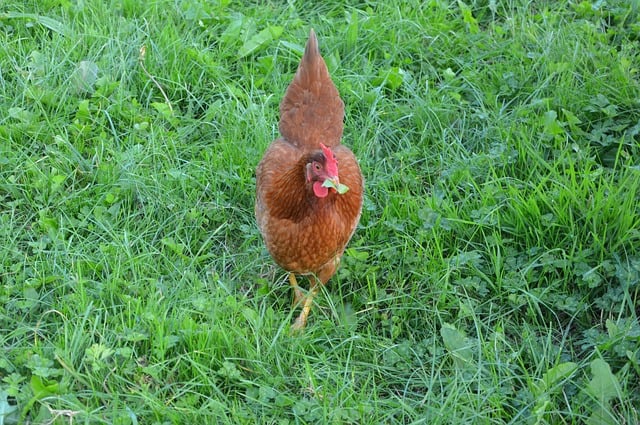
Understanding the Nutritional Needs of Chickens
Raising backyard chickens can be a rewarding experience, especially when you see them happily pecking away and laying beautiful, fresh eggs. But, as a responsible chicken owner, it’s essential to understand the nutritional needs of your flock to keep them healthy and productive.
Let’s discuss the basic nutritional requirements for chickens and how different feed types cater to various poultry species.
Basic nutritional requirements for chickens
Chickens need a balanced diet with essential nutrients, including protein, energy, vitamins, and minerals. The precise nutritional needs of a chicken vary depending on factors like age, breed, and purpose (meat production or egg-laying).
Laying hens, for instance, require more calcium and phosphorus to produce strong eggshells, while meat birds need a higher protein content for muscle development.
Differences in feed types for various poultry species
Different poultry species have unique nutritional requirements, so manufacturers produce specialized feeds for chickens, turkeys, ducks, and other birds. Although these feeds may seem similar, they’re formulated to cater to the specific needs of each species.
[ChickenAffiliate]
Composition of Turkey Feed
Before we dive into whether chickens can eat turkey feed, let’s take a closer look at what it’s made of and how it compares to chicken feed.
Primary ingredients and nutrients
Turkey feed is formulated to support young turkeys’ (poults) rapid growth and development. It typically contains higher protein levels (around 28-30%) than chicken feed, which usually has a protein content of about 16-18% for layers and 20-24% for broilers. Turkey feed also contains a balanced mix of energy sources, vitamins, and minerals.
Comparison with chicken feed composition
As mentioned, the main difference between turkey and chicken feed lies in their protein content. However, there are other minor differences in the levels of vitamins and minerals, such as calcium, phosphorus, and certain trace elements. These distinctions ensure that each poultry species receives the optimal diet for its unique requirements.
Can Chickens Eat Turkey Feed?
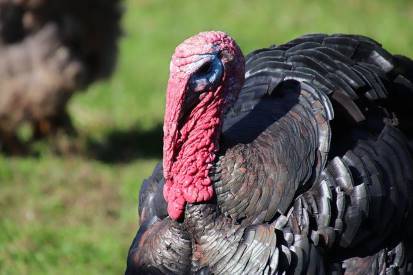
Now that we understand the differences between chicken and turkey feed let’s explore the potential benefits and drawbacks of feeding turkey feed to chickens.
Potential benefits of consuming turkey feed
At first glance, the higher protein content in turkey feed might seem like an advantage for chickens. Protein is essential for growth, feather development, and overall health. If chickens are under stress, molting, or recovering from an illness, they might benefit from a temporary boost in protein intake.
Possible risks and drawbacks
Feeding turkey feed to chickens isn’t without its potential downsides. The most significant concern is the imbalance of nutrients that may arise from consuming a diet designed for another species. For example, the calcium levels in turkey feed might not be sufficient for laying hens, leading to weak eggshells and potential health issues.
Additionally, the high protein content in turkey feed could cause kidney damage in chickens if consumed for a prolonged period.
Effects on Egg Production and Quality
Feeding turkey feed to chickens can have implications for egg production and quality. Let’s explore how this dietary change may impact egg size, shell strength, yolk color, and nutritional content.
Impact on egg size and shell strength
Since turkey feed has lower calcium levels than layer feed, feeding it to laying hens may decrease eggshell strength. Weak eggshells can result in breakage, which increases the risk of contamination and reduces the overall egg quality.
The nutrient imbalance may also affect egg size, positively or negatively, depending on the individual bird.
Changes in yolk color and nutritional content
The dietary changes brought about by feeding turkey feed to chickens can also affect yolk color and nutritional content. Yolk color is influenced by the pigments in a chicken’s diet, and turkey feed may have a different composition of these pigments than chicken feed. This could result in paler yolks or a color variation.
The nutritional content of eggs, such as the levels of vitamins and minerals, may also be altered. Since turkey feed is not specifically designed for egg-laying hens, it may not provide the optimal balance of nutrients needed for high-quality eggs.
Alternatives to Feeding Turkey Feed to Chickens
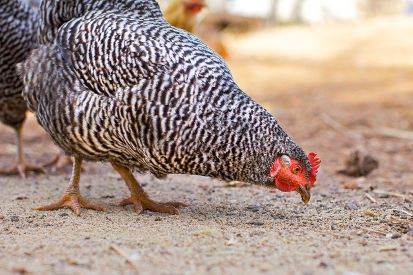
If you’re considering feeding turkey feed to your chickens, you might want to explore some alternatives to ensure your flock receives the appropriate nutrients.
Mixing turkey and chicken feed
One option is to mix turkey feed with chicken feed to balance the nutrient content. This approach can help increase protein levels while maintaining the essential vitamins and minerals in chicken feed.
However, it’s essential to consult a poultry nutritionist or veterinarian to determine the appropriate ratios for mixing feeds.
Supplementing with additional nutrients
Another option is to provide supplementary nutrients alongside the turkey feed to meet your chickens’ specific needs. For example, you can offer a calcium supplement, like crushed oyster shells or limestone, to laying hens to ensure they have enough calcium for strong eggshells.
However, it’s crucial to closely monitor your flock’s health and consult an expert if you’re unsure about supplementation.
Precautions and Recommendations
When feeding any type of feed to your chickens, it’s essential to monitor their health and watch for signs of nutritional deficiencies.
Signs of nutritional deficiencies in chickens
Nutritional deficiencies can manifest in various ways, such as poor feather quality, reduced egg production, weak eggshells, lethargy, or stunted growth. If you notice any of these signs in your flock, it’s essential to consult a veterinarian or poultry expert for guidance.
When to consult a veterinarian or poultry expert
If you’re considering feeding turkey feed to your chickens or making any significant changes to their diet, it’s best to consult a veterinarian or poultry expert first. They can provide tailored advice on the best feeding practices and help you monitor your flock’s health to ensure they receive the nutrients they need to thrive.
Additional Considerations When Feeding Turkey Feed to Chickens
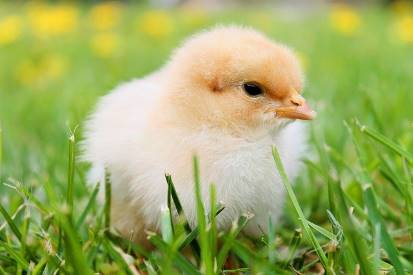
While we’ve covered the main aspects of feeding turkey feed to chickens, there are a few additional points worth mentioning to provide a comprehensive understanding.
Growth Rate Differences
One reason turkey feed has a higher protein content is that turkeys have a faster growth rate than chickens. Feeding chickens a diet that promotes rapid growth, like turkey feed, could lead to potential health issues, such as skeletal problems or cardiovascular issues.
Turkey Feed Formulations
Different formulations of turkey feed are available, such as starter, grower, and finisher feeds, each catering to various stages of a turkey’s life. It’s important to consider these variations when evaluating the suitability of turkey feed for chickens, as some formulations may be more compatible with chickens’ nutritional needs than others. However, none of these turkey feed formulations will be an ideal match for chickens’ specific dietary requirements.
Organic and Non-GMO Feed Options
If you’re concerned about the ingredients in your poultry feed, consider looking for organic or non-GMO options. Many feed manufacturers offer organic and non-GMO versions of both turkey and chicken feeds.
While these options may be more expensive, they can provide peace of mind if you prefer a more natural approach to your flock’s nutrition.
Monitor Your Flock Closely
Regardless of the type of feed you choose for your chickens, it’s crucial to monitor their health, behavior, and productivity closely. If you notice any changes or issues after introducing a new feed, consult a veterinarian or poultry expert immediately.
What other feeds can chickens eat apart from turkey feed?
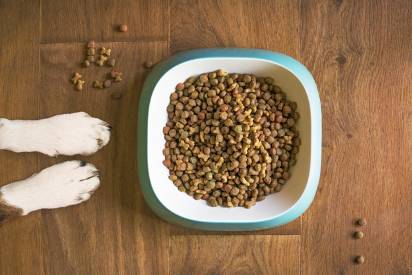
As backyard chicken keepers, we always want to ensure our flock gets the best nutrition possible. While we’ve discussed turkey feed as an option, there are other types of feeds available that might cross your mind. In this section, we’ll explore five alternative feeds and whether they’re suitable for chickens to eat.
Dog Food
While dog food may seem like an odd choice for chickens, it can be fed to them as an occasional treat. Dog food is often high in protein and contains various nutrients that can benefit your flock.
However, it’s essential to remember that dog food is not formulated for chickens’ specific nutritional requirements, so it should not replace their regular feed. Make sure to moisten the dry dog food before offering it to your chickens to prevent choking.
Read More: Can Chickens Eat Dog Food? The Truth Revealed
Cat Food
Like dog food, cat food can be given to chickens as an occasional treat. Cat food is even higher in protein than dog food, which can provide a temporary protein boost for your chickens if needed.
However, it is essential to exercise caution when feeding cat food, as it is not designed for chickens and should not replace their regular feed. Additionally, moisten the dry cat food before offering it to your chickens to avoid choking hazards.
Read More: Can Chickens Eat Cat Food? Discover The Surprising Answer
Rabbit Food
Rabbit food, specifically pelleted rabbit food, can be fed to chickens in moderation. It typically contains a mix of alfalfa, grains, and other nutrients, which can benefit your flock.
However, rabbit food lacks essential nutrients like calcium and has different protein levels than chicken feed, so it should not be your chickens’ primary source of nutrition.
Read More: Can Chickens Eat Rabbit Food? Simple Answer & Feeding Tips
Sweet Feed
Sweet feed, commonly fed to horses and other livestock, is a mix of grains, molasses, and other ingredients. While chickens may be attracted to the sweet taste of this feed, it’s not an ideal choice for them.
Sweet feed lacks the essential nutrients that chickens need and can lead to obesity and other health issues if consumed in large quantities. It’s best to offer sweet feed only as an occasional treat, if at all.
Read More: Can Chickens Eat Sweet Feed? The Surprising Truth Revealed
Goat Feed
Goat feed is another option you might consider for your chickens. However, it’s important to note that goat feed is formulated for the unique nutritional needs of goats, not chickens.
While chickens can consume goat feed in moderation, it should not be their primary source of nutrition. Goat feed may lack some essential nutrients required by chickens, such as sufficient calcium levels for laying hens.
Read More: Can Chickens Eat Goat Feed? Risks & Alternatives Explained
Can chickens eat turkey feed – final thoughts
In conclusion, while chickens can consume turkey feed, it’s not the best choice for their primary diet. The differences in protein content and other nutrients between turkey and chicken feed can lead to imbalances, impacting your flock’s overall health and productivity, particularly in egg production and quality.
To ensure the wellbeing of your chickens, provide them with a balanced diet specifically designed for their needs. By staying informed and making informed decisions, we can support our backyard chickens in leading healthy lives and producing high-quality eggs.
Related Articles:
